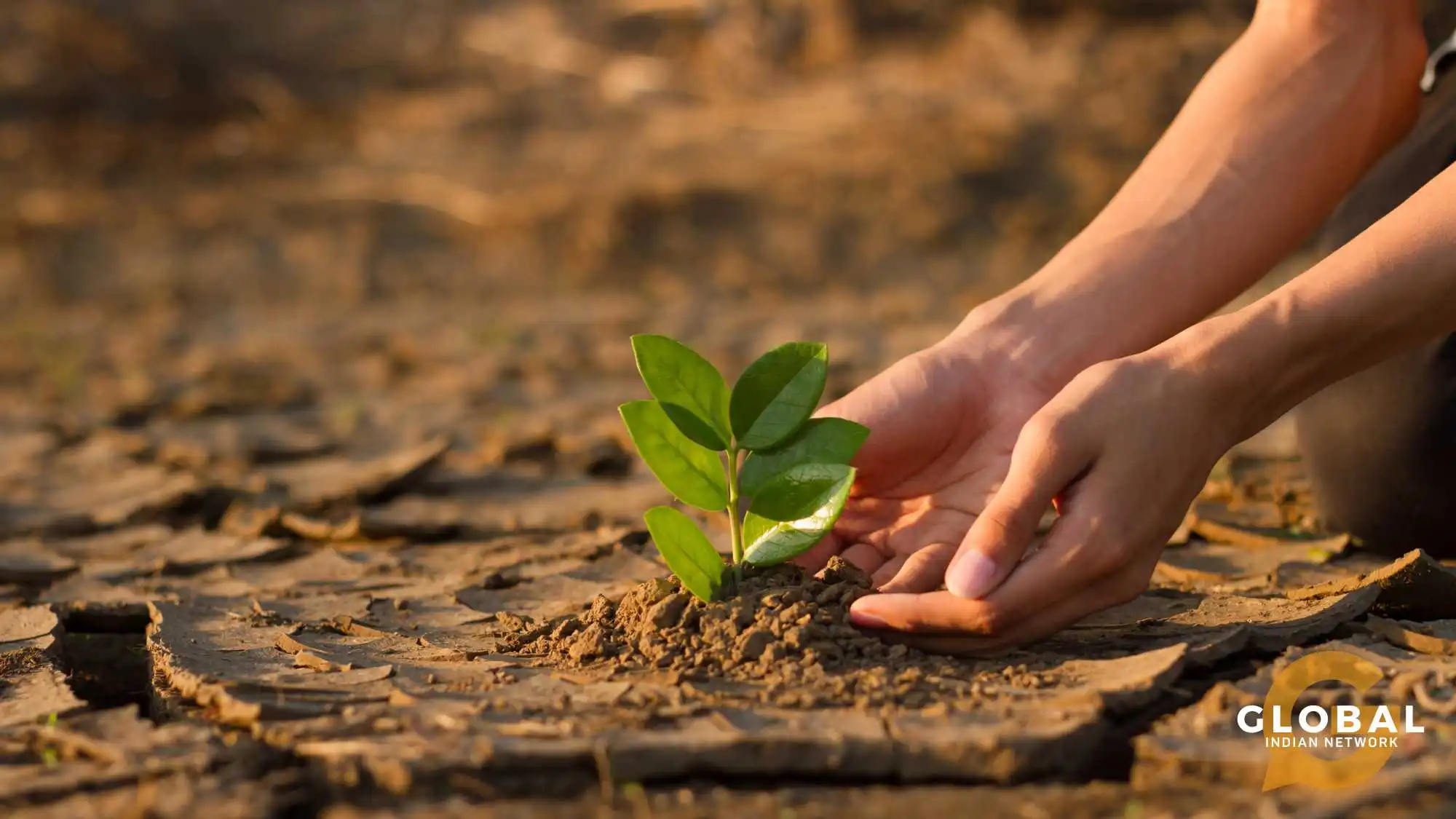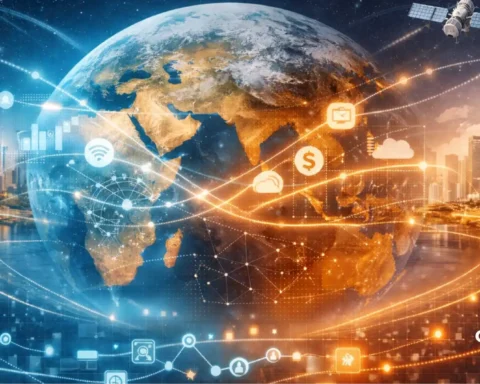Right from the time we wake up till the time we sleep, we all depend on digitisation and technology to do our daily activities. From cars, bikes, kitchen appliances to televisions, we can’t imagine our lives without them. Human encroachments have taken over the habitats of animals and made them homeless. These technological advancements have undoubtedly improved our lives in many ways. Still, we must also acknowledge the environmental cost of reliance on technology. Have you ever imagined the plight of our planet Earth and the climate crisis it’s going through? Have you noticed why natural disasters are taking place now and then?
Cyclone Michaung, which formed over the Bay of Bengal on December 4, 2023, was the latest cyclone to affect Chennai. It intensified into a cyclonic storm and made landfall between Nellore and Machilipatnam in Andhra Pradesh on December 5, 2023, with wind speeds of 80-90 mph, gusting to 100 mph. While the cyclone directly hit Andhra Pradesh, it brought heavy rainfall and strong winds to Chennai and other parts of Tamil Nadu. The city witnessed severe waterlogging, power outages, and property damage.
The climate crisis is a term used to describe the long-term effects of human activities on the Earth’s climate system. These effects include global warming, the long-term heating of the Earth’s climate system observed since the pre-industrial period (between 1850 and 1900) due to human activities, primarily fossil fuel burning.
Factors Affecting the Climate Crisis
The climate crisis is a complex issue with many contributing factors, but human activity is the primary driver. Here are some activities we are doing that are causing the climate crisis.
Burning Fossil Fuels
Fossil fuels like coal, oil, and natural gas are the primary source of greenhouse gas emissions, which trap heat in the atmosphere and cause the planet to warm. When we burn fossil fuels for transportation, electricity generation, and other purposes, we release these gases into the air, contributing to climate change.
Deforestation
Forests play a vital role in absorbing carbon dioxide from the atmosphere. When we cut down trees, we release this stored carbon into the air, accelerating climate change. Deforestation also disrupts ecosystems and contributes to soil erosion and water pollution.
Industrial Agriculture
Modern agriculture practices, such as intensive farming and, synthetic fertilisers and pesticides, contribute to climate change in several ways. They release greenhouse gases, including nitrous oxide and methane, contributing to deforestation and soil degradation.
Livestock Production
Raising livestock for food is a significant source of greenhouse gas emissions, mainly methane. Methane is a much more potent greenhouse gas than carbon dioxide, and it substantially impacts climate change. Livestock production also contributes to deforestation and water pollution.
Transportation
The transportation sector is a significant source of greenhouse gas emissions, primarily from cars, trucks, and aeroplanes. As vehicles on the road increase, so too do emissions. Transportation also contributes to air pollution and traffic congestion.
Urbanisation
As the world’s population grows, so does the number of people living in cities. Cities are major sources of greenhouse gas emissions due to energy consumption, transportation, and waste generation. Urbanisation also contributes to the heat island effect, which can exacerbate the impacts of climate change.
Industrial Activity
Industrial activity is a major source of greenhouse gas emissions, including carbon dioxide, methane, and nitrous oxide. Manufacturing processes, power generation, and other industrial activities contribute to climate change.
Waste Disposal
The way we dispose of waste contributes to climate change in several ways. Landfills release methane, a potent greenhouse gas. Incineration of waste also releases greenhouse gases and air pollutants. Recycling and composting can help to reduce the climate impact of waste disposal.
Consequences of Climate Crisis
However, it is clear that human activity is the primary driver of climate change, and we must take action to reduce our impact on the planet.
Rising Global Temperatures
The Earth’s average temperature has surged by 1°C since the pre-industrial era. This concerning trend shows no signs of slowing unless we address greenhouse gas emissions promptly. This trajectory is visually depicted in the Global Temperature Rise graph [source: earthobservatory.nasa.gov].
Extreme Weather Events
Increasing temperatures fuel a surge in extreme weather events—heatwaves, droughts, floods, wildfires, and storms—causing widespread damage and displacement. The unpredictability of these events
poses a growing challenge for communities worldwide.
Sea Level Rise
Melting glaciers and ice sheets increase sea levels, threatening coastal communities and ecosystems. This rise contributes to coastal erosion and flooding, putting vulnerable regions at risk.
Ocean Acidification
The oceans are absorbing escalating levels of carbon dioxide, leading to acidification. This phenomenon harms marine life, particularly coral reefs, and disrupts the delicate balance of the ocean ecosystem.
Loss of Biodiversity
Climate change disrupts habitats, temperature, and precipitation patterns, contributing to global biodiversity loss. This poses a significant threat to our planet’s health and future generations’ well-being [source: philips.com, Biodiversity Loss Graph].
Human Health Impacts
Climate change already adversely affects human health, manifesting in heat-related illnesses, respiratory problems, and waterborne diseases. Low-income countries are particularly vulnerable to the escalating severity of these impacts.
Economic Impacts
The economic toll of climate change is staggering, costing billions of dollars annually. The financial repercussions are substantial and expected to escalate from property and infrastructure damage to agricultural disruptions and increased energy and water expenses.
Ways to Resolve Climate Crisis
The climate crisis is a severe problem, but there is still time to take action. We can overcome this challenge by working together and creating a more sustainable future for our planet.
There are several ways to overcome the climate crisis. These include:
- Reducing greenhouse gas emissions: This can be done by transitioning to renewable energy sources, improving energy efficiency, and reducing deforestation.
- Adapting to the effects of climate change: This includes building seawalls to protect coastal communities from rising sea levels, developing drought-resistant crops, and improving early warning systems for extreme weather events.
- Investing in research and development: This is necessary to develop new technologies for reducing greenhouse gas emissions and adapting to the effects of climate change.
COP28: Hope in the Face of Climate Crisis
As the world grapples with the devastating consequences of climate change, the 28th Conference of the Parties (COP28) to the United Nations Framework Convention on Climate Change is underway in Dubai, United Arab Emirates, from November 30 to December 12, 2023.
This year’s COP28 carries immense significance, coming at a critical juncture where the urgency for decisive action against climate change has never been greater. With extreme weather events becoming increasingly frequent and intense, rising sea levels threatening coastal communities, and the loss of biodiversity accelerating at an alarming rate, the need for international collaboration and commitment to tackling these challenges is paramount.
But what happens if we fail to act? Imagine a world ravaged by extreme weather events, where rising sea levels swallow coastal cities, and droughts and floods devastate agricultural lands. Imagine a world where millions are displaced, where resources are scarce, and where conflict erupts over the remnants of a dying planet.
This is not just a fight for the environment. This is a fight for our survival. It is a fight for the future of generations to come. Let us rise to the challenge and leave a legacy of hope and action. We can overcome the climate crisis and build a brighter future for ourselves and our planet.










[…] years Bengaluru faced a water crisis over the time. Bengaluru, the hub of IT and home to a huge population, usually faces a water crisis […]